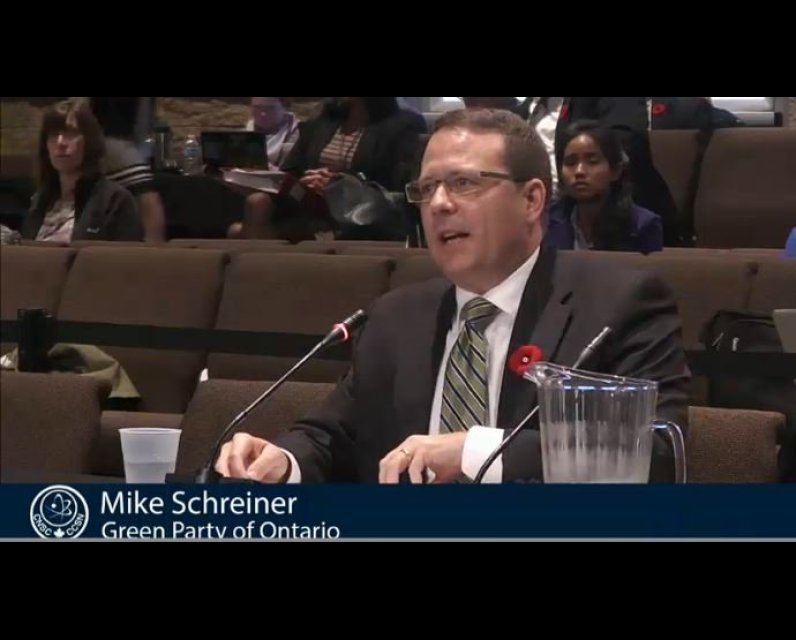Good afternoon Members of the Commission.
My name is Mike Schreiner, I’m leader of the Green Party of Ontario.
I appreciate the opportunity to express my concerns with Ontario Power Generation’s (OPG) application for an unprecedented 13 year licence to operate the Darlington nuclear station.
Each and everyone of you, as members of the CNSC, are entrusted with a huge responsibility. I know you take that responsibility seriously. The safety of millions of Canadians are in your hands.
For this reason, I implore you to proceed cautiously.
Nuclear power is far too risky and there are too many unanswered questions for the Canadian Nuclear Safety Commission (CNSC) to abandon its past practice of granting 2 to 5 year licences.
I urge you to deny OPG’s application for an unprecedented 13 year licence.
Offsite Emergency Planning
The Green Party is deeply concerned that offsite emergency response plans at Darlington will not be able to cope with a Fukushima scale accident. This is unacceptable for a nuclear plant located in the most densely populated region in Canada, only 60 km from downtown Toronto.
Since on average a major nuclear accident is happening once per decade, it is important for individuals entrusted with nuclear safety to have a risk management perspective that asks not if but when and where will a major nuclear accident happen.
For this reason, it is imperative that OPG’s emergency response plans be beyond reproach.
The CNSC made a positive step forward in maintaining public safety when you passed Regulatory Document 2.10.1 with new offsite emergency planning requirements. The fact that OPG will not be in compliance with Regulatory Document 2.10.1 until 2018 raises serious questions regarding the advisability of granting an unprecedented 13 year licence.
In 2012, the Green Party joined hundreds of Ontarians in requesting a study on the environmental effects of a major accident and the adequacy of existing emergency measures to respond to a Fukushima-scale radiation release at Darlington.
It is our belief that this was a reasonable and responsible request. Before OPG is allowed to rebuild the Darlington reactors, the people of Ontario, OPG and CNSC should understand the public safety risks involved so appropriate emergency plans can be put in place.
While the GPO appreciates CNSC’s efforts to conduct an accident study, we find it deeply disturbing that the CNSC has not publicly released the results of any study assessing the consequences of a level 7 International Nuclear and Radiological Event Scale (INES) accident similar to Fukushima.
In the absence of a level 7 INES accident study, we believe it would be irresponsible for the CNSC to grant OPG an unprecedented 13 year licence.
Before OPG is allowed to rebuild the Darlington nuclear station they should be required to prove their emergency plans can protect the people of Ontario. The CNSC should not grant a life-extension licence for Darlington without the full disclosure of the impacts of a major Fukushima like accident.
Public safety and government accountability for our safety should be of paramount importance. And I deeply hope the CNSC does not allow OPG to cut any corners in ensuring proper emergency plans are in place.
In the absence of objective information from the CNSC and the government of Ontario on the impacts of major accidents, Green Party members passed policy in 2014 calling for an integrated provincial and federal emergency management plan that takes into account the possibility of a severe accident at an Ontario nuclear generating station, including multiple simultaneous reactor accidents.
We also believe the government must implement emergency measures to improve notification and evacuation of residents, as well as mitigation of the effects of radiotoxic releases. The Green Party has also pushed for a government mandate requiring the pre-distribution of potassium iodide (KI) pills to all residents living within 30 kilometers of a nuclear generating station.
Public Accountability
The Green Party is concerned that OPG’s unprecedented request for a 13 year licence will reduce public transparency. No Canadian nuclear power reactor operator has ever been given such a long licence. For the past 50 years, Canadian nuclear stations have been given 2 to 5 year licences.
Regular re-licensing hearings are needed so the public and regulators can review OPG’s operations, ask questions and provide the kind of public scrutiny needed to reduce the risk of accidents. This ensures that OPG remains accountable to the people of Ontario, especially its host community. Reduced public scrutiny and oversight can lead to complacency. This is partially responsible for the scale and severity of the accident at Fukushima.
Regular re-licensing hearings also allow for public discussion of new nuclear risks and safety measures in the wake of any major nuclear accidents that might happen in the next decade. Since on average there has been a major nuclear accident once each decade, it is likely that such an accident will happen in the next 13 years.
We are further concerned that OPG is requesting a 13 year licence during a time of increased complexity at the Darlington nuclear station. Over the next 13 years OPG plans to rebuild the four aging reactors at Darlington. Rebuilding the four reactors is far more complex than simply operating the reactors. More complexity increases risks at Darlington. Increased risks should require more public scrutiny from licensing hearings, not less.
Rebuilding the Darlington nuclear station also presents unnecessary financial risks for the province and Ontario ratepayers. No nuclear plant in Canadian history has been delivered on time or on budget. Since water power from Quebec and conservation programs provide lower cost alternatives to rebuilding Darlington, the province should examine lower cost, less risky alternatives.
As a result, it makes no financial sense to grant Darlington a 13-year licence and permission to rebuild the four aging Darlington reactors without an independent public review of the costs and alternatives to rebuilding the Darlington nuclear station.
Conclusion
In conclusion, I want to thank you for providing me with the opportunity to share the perspective of Green Party members and supporters. I also want to thank you for taking on the important responsibility for overseeing public safety.
I know you take this responsibility seriously, and for this I am confident that you will reject OPG’s request for an unprecedented 13 year licence to operate the Darlington nuclear station.




Comments
Be the first to comment